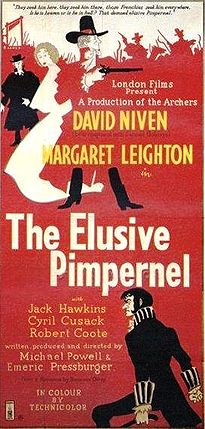
THE ELUSIVE PIMPERNEL
UK, 1950, 110 minutes, Colour.
David Niven, Margaret Leighton, Cyril Cusack, Jack Hawkins, Robert Coote, Patrick Macnee.
Directed by Michael Powell and Emeric Pressburger.
The Elusive Pimpernel is yet another version of the famous story by Baroness Orczy. The classic version is that with Leslie Howard and Raymond Massey, made in 1934. This film can be seen as a lavish remake, with emphasis on spectacle, costume and décor and pageantry rather than giving full rein to the action, adventure and espionage.
The film was written and directed by The Archers, the team of Michael Powell and Emeric Pressburger. They had made great impact during World War II with The Life and Death of Colonel Blimp, after the war with A Matter of Life and Death as well as with other film like The Canterbury Tales and The Small Back Room. This film preceded another attempt at historical drama, Gone to Earth. They continued to make films during the 1950s but, with Peeping Tom, Michael Powell found that he was not so welcome in England and indeed made They’re a Weird Mob and Age of Consent in Australia.
David Niven is debonair as the Elusive Pimpernel but doesn't have the commanding screen presence of Leslie Howard. Cyril Cusack is a mincing and sinister Chauvelin. It is a surprise to see Jack Hawkins as the Prince Regent (and, if noticed, doubling as a footpad in an attack on the highway). Robert Coote and Patrick Macnee can be seen in supporting roles.
There was a television remake in the 1970s with Anthony Andrews and in the beginning of the 21st century with Richard E. Grant.
1. The popularity of the Elusive Pimpernel story? The many versions? The adaptation for World War II with Pimpernel Smith? The story of the Vatican monsignor who spirited prisoners out of Italy, The Scarlet and the Black, with Gregory Peck?
2. The colour photography, costumes and décor, re-creation of the 18th century in France, the aristocracy, in England? The riots and the executions of the French Revolution? The musical score?
3. The introduction to the Pimpernel, the old hag and her getting through, the technique of disguise adopted by the Scarlet Pimpernel? His moving easily in and out of France? The use of Mont San Michel as a rendezvous for the ships? The support of the abbot? His work in helping the aristocracy to escape to England?
4. Percy Blakeny, his manner and foppish style in London, at the baths, with the Prince Regent and discussion about his clothes? His creating the poem? His disguise, manner? His wife being deceived? His work with his band of supporters? Their using the Prince Regent as a cover?
5. Dover, the arrival of Percy’s wife, her arrogance, the French and their disdain of her, her history of betraying royalty to the revolution (and her later explanation of the assaults on herself)? Her discussions with Percy, his putting her off? The pressure from Chauvelin during the ball, her betraying Sir Andrew, her talking to Percy, her discovery of his room with the disguises, going to France to support him and to save Sir Andrew? His saving her at the end?
6. Percy and his double life, his shrewdness, getting into France, disguising himself as a French official, as Chauvelin? Dressing up in Chauvelin’s clothes? The rendezvous at Mont San Michel? Chauvelin and his troops, underestimating the tide coming in? His thinking that he was executed after letting his wife go? Percy’s return, with his band? Helping the refugees to escape?
7. Marguerite’s brother, the messages from France, the use of carrier pigeons?
8. England at the end of the 18th century, the aristocracy, George III, the Prince Regent and his foppish manner, the race to Brighton? With ladies, reciting the Pimpernel poem?
9. Percy and his group of supporters, their disguises in France, helping with communications, transport, the dangers? In Mont San Michel for the climax?
10. The activities of the Scarlet Pimpernel during the revolution, the perspective of the aristocracy rather than the revolutionaries? The attitude of the English? A perennially popular story – but very much linked with monarchy and aristocracy?